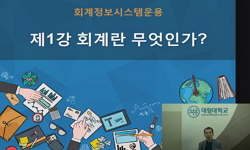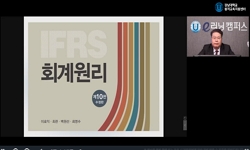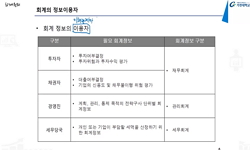This paper re-examines accounting transparency in Korea by surveying broad groups to develop appropriate measures. From the survey, we identify opinions from various groups related to accounting industry and evaluate the extent to accounting transpare...
http://chineseinput.net/에서 pinyin(병음)방식으로 중국어를 변환할 수 있습니다.
변환된 중국어를 복사하여 사용하시면 됩니다.
- 中文 을 입력하시려면 zhongwen을 입력하시고 space를누르시면됩니다.
- 北京 을 입력하시려면 beijing을 입력하시고 space를 누르시면 됩니다.
https://www.riss.kr/link?id=A99846122
- 저자
- 발행기관
- 학술지명
- 권호사항
-
발행연도
2010
-
작성언어
Korean
- 주제어
-
KDC
325.9
-
등재정보
KCI등재
-
자료형태
학술저널
- 발행기관 URL
-
수록면
327-362(36쪽)
-
KCI 피인용횟수
9
- DOI식별코드
- 제공처
-
0
상세조회 -
0
다운로드
부가정보
다국어 초록 (Multilingual Abstract)
We survey with more broad questions to estimate the extent and change in accounting transparency in Korea. Using answer sheets from 202 interviewed persons, we find that 28 of the 39 surveyed questions are reported improved accounting transparency. Specifically, we examine accounting transparency in three perspectives. First, we find that accounting opacity, enforcement of accounting principle, and access to financial information are improved compared to results of PwC survey. Second, results from surveyed indicate that insufficient accounting information written by English, ignorant about accounting standard, light punishment for accounting fraud. less effective internal accounting control system, and insufficient disclosure about note in financial statement are negatively-valuated items. This suggests that implementation of accounting principle rather than modification of accounting principle is more important factors to enhance accounting transparency. Third, when we classify the interviewed groups into three based on the level of understanding on Korea Accounting Standards, fullness and easiness of access to accounting information are positively estimated for producer and intermediary groups of accounting information, but not for users of accounting information. This result suggests that evaluation on accounting transparency may differ depending on the level of understanding on Korea Accounting Standards. Especially, users of accounting information such as financial analysts and credit analysts estimate that acquisition or access to accounting information is still difficult while certified public accountant, professors in accounting department and regulators are not.
We propose six suggestions for enhancement of accounting transparency based on results from survey. The first is to expand participation of users and producer of accounting information in Accounting Standard Board which develops accounting principles. From the extended participation, we can reflect practical and specific issues in accounting principles. The second is to require to disclosure accounting information written by English for listed companies. Even though we have well-structured accounting principle and practical guidance, it hard to obtain related information for foreign investors. it results in biased opinion and then recognition gap between inside and outside investors. Therefore, providing accounting information including financial statement and various disclosures are necessary to reduce information asymmetry. The third is to reinforce independence of external auditor. To get independence of external auditor, we recommend that audit contract should be engaged with audit commitment, not management. In addition, company have to has responsibility for violation of independence of external auditor. The fourth is to strength the responsibility and punishment of firms in terms of disclosure of financial statement. The fifth is to strength the control role on disclosure rather than accounting principle in regulated party. Because International Financial Reporting Standard (IFRS) emphasis the importance of fair value and various disclosures rather than accounting principle, regulated party should concern implementation of IFRS in practical way. Finally the sixth is to provide opportunity to learn specialized accounting education. Adoption of IFRS requires special person in accounting field. Specifically, in the early period of implementation of IFRS, need for accounting-specialized staff is severe. Therefore, procuration and cultivation human resources in accounting is critical success factors for IFRS implementation.
We also suggest that providing information about accounting transparency in Korea to foreign agencies will lead to more appropriate evaluation on our status. In addition, providing accounting information such as financial statements and various disclosures written by English enhances understanding on accounting transparency in Korea.
This paper re-examines accounting transparency in Korea by surveying broad groups to develop appropriate measures. From the survey, we identify opinions from various groups related to accounting industry and evaluate the extent to accounting transparency. Then we suggest several recommendations based on our results. To do this, we make a questionnaire designed to test the extent of accounting transparency and distribute it to a variety of people including certified public accountant, financial analysts, members of accounting regulated body, professors in accounting department. chief financial officer in Korea companies and foreign companies, and analysts in credit companies. On average, they worked for 9 years and over 60 percentage of them fully understand Korea Accounting Standards. It represents our survey groups have enough knowledge and interest about Korea Accounting Standard. We first re-estimate the questions used in PwC survey to investigate whether accounting transparency improves over time. We find that accounting transparency in terms of accounting standard, enforcement of standard, and access to accounting information has improved.
We survey with more broad questions to estimate the extent and change in accounting transparency in Korea. Using answer sheets from 202 interviewed persons, we find that 28 of the 39 surveyed questions are reported improved accounting transparency. Specifically, we examine accounting transparency in three perspectives. First, we find that accounting opacity, enforcement of accounting principle, and access to financial information are improved compared to results of PwC survey. Second, results from surveyed indicate that insufficient accounting information written by English, ignorant about accounting standard, light punishment for accounting fraud. less effective internal accounting control system, and insufficient disclosure about note in financial statement are negatively-valuated items. This suggests that implementation of accounting principle rather than modification of accounting principle is more important factors to enhance accounting transparency. Third, when we classify the interviewed groups into three based on the level of understanding on Korea Accounting Standards, fullness and easiness of access to accounting information are positively estimated for producer and intermediary groups of accounting information, but not for users of accounting information. This result suggests that evaluation on accounting transparency may differ depending on the level of understanding on Korea Accounting Standards. Especially, users of accounting information such as financial analysts and credit analysts estimate that acquisition or access to accounting information is still difficult while certified public accountant, professors in accounting department and regulators are not.
We propose six suggestions for enhancement of accounting transparency based on results from survey. The first is to expand participation of users and producer of accounting information in Accounting Standard Board which develops accounting principles. From the extended participation, we can reflect practical and specific issues in accounting principles. The second is to require to disclosure accounting information written by English for listed companies. Even though we have well-structured accounting principle and practical guidance, it hard to obtain related information for foreign investors. it results in biased opinion and then recognition gap between inside and outside investors. Therefore, providing accounting information including financial statement and various disclosures are necessary to reduce information asymmetry. The third is to reinforce independence of external auditor. To get independence of external auditor, we recommend that audit contract should be engaged with audit commitment, not management. In addition, company have to has responsibility for violation of independence of external auditor. The fourth is to strength the responsibility and punishment of firms in terms of disclosure of financial statement. The fifth is to strength the control role on disclosure rather than accounting principle in regulated party. Because International Financial Reporting Standard (IFRS) emphasis the importance of fair value and various disclosures rather than accounting principle, regulated party should concern implementation of IFRS in practical way. Finally the sixth is to provide opportunity to learn specialized accounting education. Adoption of IFRS requires special person in accounting field. Specifically, in the early period of implementation of IFRS, need for accounting-specialized staff is severe. Therefore, procuration and cultivation human resources in accounting is critical success factors for IFRS implementation.
We also suggest that providing information about accounting transparency in Korea to foreign agencies will lead to more appropriate evaluation on our status. In addition, providing accounting information such as financial statements and various disclosures written by English enhances understanding on accounting transparency in Korea.
국문 초록 (Abstract)
첫째, PwC의 설문항목을 재검증한 결과, 회계기준의 불투명성과 회계기준의 준수 및 재무정보의 접근용이성 모두에서 회계투명성이 시간이 경과됨에 따라 개선되고 있다. 둘째, 회계투명성과 관련하여 많은 설문항목들이 긍정적으로 평가되었지만, 영문자료 미제공·경영자의 회계기준에 대한 무지·분식회계 처벌의 미흡·내부회계관리제도의 시행오류·주석공시의 불충분성에 대한 부정적인 평가가 매우 높았다. 또한, 회계투명성의 저해요인으로도 경영자의 간섭이나 무지, 분식회계에 대한 처벌미흡, 외부감사인의 낮은 독립성이 지적되었다. 셋째, 회계정보의 이용자(신용심사자와 재무분석가)와 생산자(기업의 회계담당자) 및 중계자(공인회계사, 교수, 회계감독자) 간의 회계투명성에 대한 인식차이가 매우 크다. 회계기준의 적절성 및 일관성에 대해서 세 집단 모두 긍정적으로 평가하고 있지만, 회계정보 이용자의 경우 생산자와 중계자의 긍정적인 평가에 크게 미치지 못하고 있다. 더욱이 회계 및 재무정보 제공의 충분성과 접근용이성 등에 대해서는 회계정보 생산자와 중계자가 긍정적으로 평가하는 반면, 이용자의 평가는 여전히 부정적이다.
본 연구는 이러한 설문결과를 바탕으로 회계투명성 제고의 가속화를 위하여 다음의 6가지 개선사항을 제안한다. 첫째, 회계감독 및 기준제정기관에 회계정보 이용자의 참여를 확대한다. 둘째, 회계·재무자료의 영문공시를 상장기업에게 의무화한다. 셋째, 감사계약의 주체를 경영자가 아닌 감사위원회로 전환하고, 외부감사인의 독립성 위배 시 감사인 뿐만 아니라 기업도 처벌하는 등 외부감사인의 독립성을 보다 강화한다. 넷째, 재무제표의 공시를 기업으로 일원화하는 등 기업의 공시책임 및 처벌을 강화한다. 다섯째, 원칙위주의 주석공시사항이 많은 국제회계기준의 전면적인 도입을 앞두고, 회계기준적용에 대한 직접적인 회계감독보다 공시에 대한 감독기능을 강화한다. 마지막으로 여섯째, 회계정보이용자로서 회계전문인력의 양성을 위한 제도적 보완이 필요하다. 또한, 본 연구는 우리나라의 회계투명성에 대한 해외기관의 평가향상을 위하여 다음의 개선사항을 제안한다. 첫째, 해외평가기관 및 국내 대행기관에 회계산업에 대한 정보를 제공하여 우리나라의 회계투명성에 대한 올바른 평가를 유도한다. 둘째, 국내회계투명성에 대한 영문보고서의 작성 및 해외평가기관에 이를 제공한다.
본 연구는 우리나라 회계투명성을 평가하기 위한 설문모형을 개발하고, 지속적인 평가를 통해 우리나라 회계투명성에 대한 변화를 파악하고자 한다. 구체적으로, 본 연구는 회계투명성에 ...
본 연구는 우리나라 회계투명성을 평가하기 위한 설문모형을 개발하고, 지속적인 평가를 통해 우리나라 회계투명성에 대한 변화를 파악하고자 한다. 구체적으로, 본 연구는 회계투명성에 대한 다양한 집단의 평가를 반영하기 위해서 회계정보의 생산자(국내외 기업의 회계관련부서)와 중계자(공인회계사, 회계감독기관, 학계) 및 이용자(대출 등 신용심사자, 재무분석가)를 모두 포함하여 총 202명의 설문결과를 조사·분석하였다. 본 연구에서 실시한 설문조사에 대한 분석결과는 다음과 같다.
첫째, PwC의 설문항목을 재검증한 결과, 회계기준의 불투명성과 회계기준의 준수 및 재무정보의 접근용이성 모두에서 회계투명성이 시간이 경과됨에 따라 개선되고 있다. 둘째, 회계투명성과 관련하여 많은 설문항목들이 긍정적으로 평가되었지만, 영문자료 미제공·경영자의 회계기준에 대한 무지·분식회계 처벌의 미흡·내부회계관리제도의 시행오류·주석공시의 불충분성에 대한 부정적인 평가가 매우 높았다. 또한, 회계투명성의 저해요인으로도 경영자의 간섭이나 무지, 분식회계에 대한 처벌미흡, 외부감사인의 낮은 독립성이 지적되었다. 셋째, 회계정보의 이용자(신용심사자와 재무분석가)와 생산자(기업의 회계담당자) 및 중계자(공인회계사, 교수, 회계감독자) 간의 회계투명성에 대한 인식차이가 매우 크다. 회계기준의 적절성 및 일관성에 대해서 세 집단 모두 긍정적으로 평가하고 있지만, 회계정보 이용자의 경우 생산자와 중계자의 긍정적인 평가에 크게 미치지 못하고 있다. 더욱이 회계 및 재무정보 제공의 충분성과 접근용이성 등에 대해서는 회계정보 생산자와 중계자가 긍정적으로 평가하는 반면, 이용자의 평가는 여전히 부정적이다.
본 연구는 이러한 설문결과를 바탕으로 회계투명성 제고의 가속화를 위하여 다음의 6가지 개선사항을 제안한다. 첫째, 회계감독 및 기준제정기관에 회계정보 이용자의 참여를 확대한다. 둘째, 회계·재무자료의 영문공시를 상장기업에게 의무화한다. 셋째, 감사계약의 주체를 경영자가 아닌 감사위원회로 전환하고, 외부감사인의 독립성 위배 시 감사인 뿐만 아니라 기업도 처벌하는 등 외부감사인의 독립성을 보다 강화한다. 넷째, 재무제표의 공시를 기업으로 일원화하는 등 기업의 공시책임 및 처벌을 강화한다. 다섯째, 원칙위주의 주석공시사항이 많은 국제회계기준의 전면적인 도입을 앞두고, 회계기준적용에 대한 직접적인 회계감독보다 공시에 대한 감독기능을 강화한다. 마지막으로 여섯째, 회계정보이용자로서 회계전문인력의 양성을 위한 제도적 보완이 필요하다. 또한, 본 연구는 우리나라의 회계투명성에 대한 해외기관의 평가향상을 위하여 다음의 개선사항을 제안한다. 첫째, 해외평가기관 및 국내 대행기관에 회계산업에 대한 정보를 제공하여 우리나라의 회계투명성에 대한 올바른 평가를 유도한다. 둘째, 국내회계투명성에 대한 영문보고서의 작성 및 해외평가기관에 이를 제공한다.
목차 (Table of Contents)
- Ⅰ. 서론
- Ⅱ. 선행연구의 검토
- Ⅲ. 회계투명성 평가모형 설계
- Ⅳ. 설문조사결과
- Ⅴ. 회계투명성 제고를 위한 제안
- Ⅰ. 서론
- Ⅱ. 선행연구의 검토
- Ⅲ. 회계투명성 평가모형 설계
- Ⅳ. 설문조사결과
- Ⅴ. 회계투명성 제고를 위한 제안
- Ⅵ. 결론
참고문헌 (Reference)
1 장지인, "우리 나라의 회계투명성에 대한 재조명" 한국회계학회 11 (11): 1-36, 2002
2 송인만, "국제적 회계신인도 10위권 진입방안에 대한 연구(특별기고논문)" 한국공인회계사회 (44) : 1-26, 2006
3 "www.weforum.org"
4 "www.ips.or.kr"
5 "www.imd.ch"
6 "www.cgs.or.kr"
7 Bushman, R., "What Determines Corporate Transparency?" 2004
8 Bushman, R., "Transparency, Financial Accounting Information, and Corporate Governance" 2003
9 Bhattacharya, U., "The world price of Earnings Opacity" 2003
10 PriceWaterCoopershouse, "The Opacity Index" 2001
1 장지인, "우리 나라의 회계투명성에 대한 재조명" 한국회계학회 11 (11): 1-36, 2002
2 송인만, "국제적 회계신인도 10위권 진입방안에 대한 연구(특별기고논문)" 한국공인회계사회 (44) : 1-26, 2006
3 "www.weforum.org"
4 "www.ips.or.kr"
5 "www.imd.ch"
6 "www.cgs.or.kr"
7 Bushman, R., "What Determines Corporate Transparency?" 2004
8 Bushman, R., "Transparency, Financial Accounting Information, and Corporate Governance" 2003
9 Bhattacharya, U., "The world price of Earnings Opacity" 2003
10 PriceWaterCoopershouse, "The Opacity Index" 2001
11 Kurtzman. J., "The Global Costs of Opacity" 2004
12 Rajan, R. G., "Power in a theory of the firm" CRSP working paper 1998
13 Beneish, M. D., "Detecting GAAP Violation: Implications for Assessing Earnings Manangement among Firms with Extreme Financial Performance" 1997
14 "& Poor's. Transparency and Disclosure: Overview of Methodology and Study Results - United States"
동일학술지(권/호) 다른 논문
-
- 韓國公認會計士會
- 김동철
- 2010
- KCI등재
-
내부회계관리제도의 효과성 검증: 타인자본비용을 중심으로
- 韓國公認會計士會
- 손성규
- 2010
- KCI등재
-
- 韓國公認會計士會
- 손성규
- 2010
- KCI등재
-
- 韓國公認會計士會
- 김용식
- 2010
- KCI등재
분석정보
인용정보 인용지수 설명보기
학술지 이력
| 연월일 | 이력구분 | 이력상세 | 등재구분 |
|---|---|---|---|
| 2026 | 평가예정 | 재인증평가 신청대상 (재인증) | |
| 2020-01-01 | 평가 | 등재학술지 유지 (재인증) |  |
| 2017-01-01 | 평가 | 등재학술지 유지 (계속평가) |  |
| 2013-05-29 | 학술지명변경 | 한글명 : 회계와 감사 연구 -> 회계ㆍ세무와 감사 연구외국어명 : Accounting & Auditing Research -> Study on Accounting, Taxation & Auditing |  |
| 2013-01-01 | 평가 | 등재 1차 FAIL (등재유지) |  |
| 2010-01-01 | 평가 | 등재학술지 유지 (등재유지) |  |
| 2008-01-01 | 평가 | 등재학술지 유지 (등재유지) |  |
| 2005-06-02 | 학술지명변경 | 외국어명 : 미등록 -> Accounting & Auditing Research |  |
| 2005-05-29 | 학술지등록 | 한글명 : 회계와 감사 연구외국어명 : 미등록 |  |
| 2005-01-01 | 평가 | 등재학술지 선정 (등재후보2차) |  |
| 2004-01-01 | 평가 | 등재후보 1차 PASS (등재후보1차) |  |
| 2002-01-01 | 평가 | 등재후보학술지 선정 (신규평가) |  |
학술지 인용정보
| 기준연도 | WOS-KCI 통합IF(2년) | KCIF(2년) | KCIF(3년) |
|---|---|---|---|
| 2016 | 1.05 | 1.05 | 1.04 |
| KCIF(4년) | KCIF(5년) | 중심성지수(3년) | 즉시성지수 |
| 1.09 | 1.23 | 2.16 | 0.17 |





 RISS
RISS






